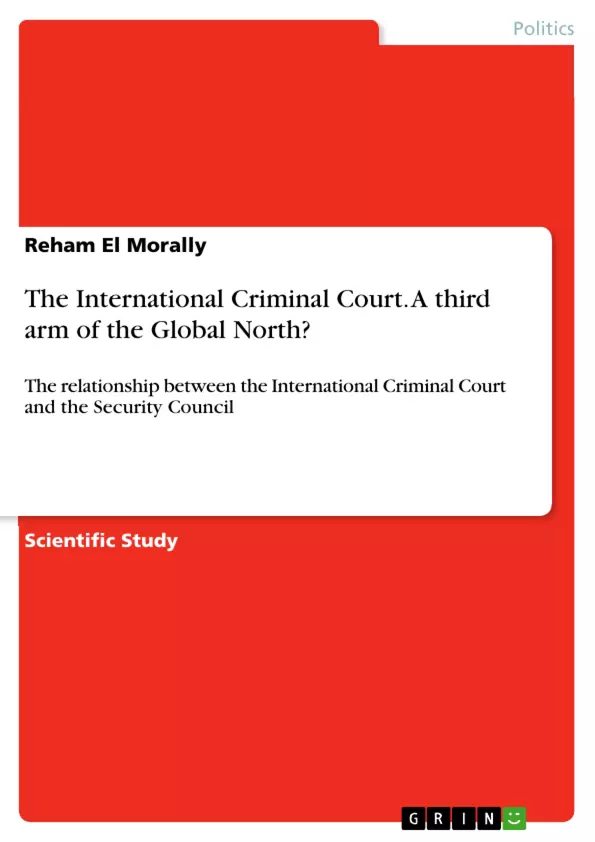The author argues that there is a strong correlation between the work of the International Criminal Court (ICC), its special interest in the "dark continent" Africa, and the permanent member of the Security Council. This work discusses the history of the ICC, its structure, funding, jurisdiction, and the relationship between the ICC and the Security Council.
Furthermore, the author debates whether there is a possible influential relationship between the ICC and global political economy. Moreover, a closer investigation into the work of the ICC, in the cases of Sudan and Libya, will follow and how it might relate to global political economy. Lastly, this work will discuss some reforms that would enhance the ICC and highlight its weaknesses. The author especially focuses on Articles 13 and 16 of the Rome Statute and tries to answer how they could be used as tools by global hegemons to control the ICC.
Inhaltsverzeichnis (Table of Contents)
- INTRODUCTION
- WHAT IS THE ICC?
- STRUCTURE OF THE ICC
- JURISDICTION OF THE ICC
- FUNDING OF THE ICC
- THE RELATIONSHIP BETWEEN THE ICC AND THE SECURITY COUNCIL
- THE WORK OF THE ICC IN LIBYA AND SUDAN
- Where and why does the ICC intervene?
- Reforming the ICC
- Conclusion
Zielsetzung und Themenschwerpunkte (Objectives and Key Themes)
This paper explores the International Criminal Court (ICC) and its potential role as an instrument of the global North, particularly focusing on its relationship with the Security Council (SC). It aims to analyze the ICC's history, structure, funding, and jurisdiction, and examine the possible connections between its work and global political economy.
- The ICC's historical development and its relationship with the UN Security Council.
- The ICC's focus on Africa and its potential implications for global power dynamics.
- The role of global political economy in shaping the ICC's actions and its potential for perpetuating inequality.
- The ICC's effectiveness in achieving justice and its potential vulnerabilities to manipulation by global hegemons.
- Potential reforms that could enhance the ICC's capacity to operate effectively and impartially.
Zusammenfassung der Kapitel (Chapter Summaries)
The introduction delves into the purpose of the ICC, outlining its potential to deliver universal justice and examining the complex power dynamics that may influence its actions. The paper then provides a comprehensive overview of the ICC's structure, jurisdiction, and funding, highlighting key aspects of its operation.
The paper further examines the relationship between the ICC and the Security Council, investigating the potential influence of the SC members on the ICC's actions and the potential for perpetuating global inequality. The analysis focuses on specific cases in Sudan and Libya to explore the ICC's intervention in conflicts and the potential interplay between its actions and global political economy.
Finally, the paper proposes potential reforms to strengthen the ICC's effectiveness and address its vulnerabilities. This includes a focus on Articles 13 and 16 of the Rome Statute, examining how these articles could potentially be used by global hegemons to control the ICC.
Schlüsselwörter (Keywords)
The key concepts and themes explored in this paper include the International Criminal Court, Africa, international law, global North, imperialism, and global political economy. The analysis also delves into the role of the Security Council, the Rome Statute, and the potential for reforms within the ICC.
Frequently Asked Questions
What is the "Global North" argument regarding the ICC?
The author argues that there is a strong correlation between the ICC's work, its focus on Africa, and the interests of the permanent members of the UN Security Council, suggesting it may act as a tool for global hegemons.
How does the UN Security Council influence the ICC?
Under Articles 13 and 16 of the Rome Statute, the Security Council has the power to refer cases to the ICC or defer investigations, which the author debates as a means of political control.
Why is the ICC's focus on Africa controversial?
Critics point out that a vast majority of the ICC's investigations have targeted African nations, leading to accusations of selective justice and neo-imperialism.
What specific cases are investigated in this study?
The paper examines the ICC's interventions in Sudan and Libya and how these relate to the global political economy.
What are the suggested reforms for the ICC?
The work discusses reforms aimed at enhancing the court's independence and addressing weaknesses in the Rome Statute that allow for political manipulation.
How is the ICC funded?
The paper provides an overview of the ICC's funding structure, which is a key aspect of its operational capacity and potential susceptibility to external influence.
- Citation du texte
- Reham El Morally (Auteur), 2019, The International Criminal Court. A third arm of the Global North?, Munich, GRIN Verlag, https://www.grin.com/document/492836



